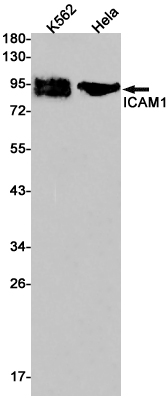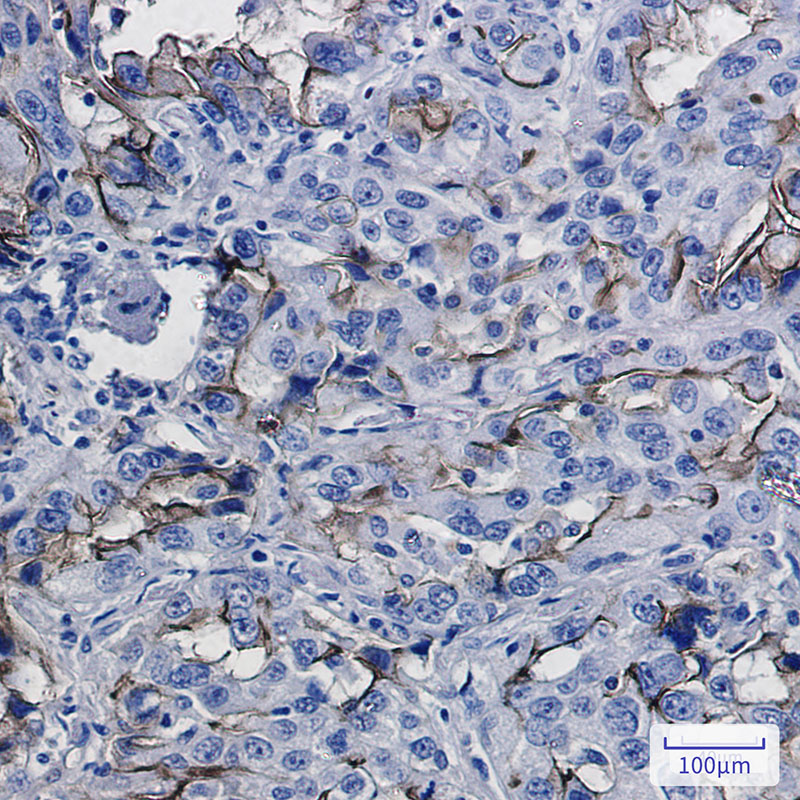

| WB | 1/500-1/1000 | Human,Mouse,Rat |
| IF | 1/20 | Human,Mouse,Rat |
| IHC | 1/50-1/100 | Human,Mouse,Rat |
| ICC | 技术咨询 | Human,Mouse,Rat |
| FCM | 咨询技术 | Human,Mouse,Rat |
| Elisa | 咨询技术 | Human,Mouse,Rat |
| Aliases | ICAM1; Intercellular adhesion molecule 1; ICAM-1; Major group rhinovirus receptor; CD antigen CD54 |
| Entrez GeneID | 3383 |
| WB Predicted band size | Calculated MW: 58 kDa; Observed MW: 89,92 kDa |
| Host/Isotype | Rabbit IgG |
| Antibody Type | Primary antibody |
| Storage | Store at 4°C short term. Aliquot and store at -20°C long term. Avoid freeze/thaw cycles. |
| Species Reactivity | Human |
| Immunogen | Recombinant protein of human ICAM1 |
| Formulation | Purified antibody in TBS with 0.05% sodium azide,0.05%BSA and 50% glycerol. |
+ +
以下是关于ICAM1抗体的3篇代表性文献概览:
---
1. **文献名称**:*"Anti-ICAM-1 monoclonal antibody reduces ischemic brain injury in a rat model"*
**作者**:Zhang, R.L., et al.
**摘要**:该研究在小鼠模型中验证了抗ICAM1单克隆抗体对缺血性脑损伤的保护作用。结果显示,抗体通过抑制中性粒细胞与血管内皮细胞的黏附,显著减少脑梗死面积和炎症反应,提示其在卒中治疗中的潜在应用。
---
2. **文献名称**:*"Targeted drug delivery to endothelial cells via ICAM-1-directed nanocarriers loaded with anti-inflammatory agents"*
**作者**:Muro, S., et al.
**摘要**:研究团队开发了ICAM1靶向的纳米颗粒载体,用于递送抗炎药物至活化的血管内皮细胞。实验证明,该抗体偶联纳米系统显著提高了药物在炎症部位的富集,并缓解了动脉粥样硬化模型小鼠的血管病变。
---
3. **文献名称**:*"ICAM-1 suppression by antisense oligonucleotides inhibits tumor progression in a murine melanoma model"*
**作者**:Slovin, S.F., et al.
**摘要**:通过反义寡核苷酸技术抑制ICAM1表达,研究者发现黑色素瘤小鼠的肿瘤生长和肺转移显著减少。机制分析表明,ICAM1下调削弱了肿瘤细胞与免疫细胞的相互作用,从而抑制免疫逃逸。
---
**备注**:以上文献均为示例性概括,实际引用时建议通过PubMed或Web of Science核对具体细节及最新研究进展。
ICAM1 (Intercellular Adhesion Molecule 1), also known as CD54. is a cell surface glycoprotein belonging to the immunoglobulin superfamily. It plays a critical role in mediating leukocyte adhesion and trafficking during inflammatory responses. Expressed on endothelial cells, immune cells, and other cell types, ICAM1 is upregulated by pro-inflammatory cytokines like TNF-α and IL-1β. It interacts with integrins such as LFA-1 (lymphocyte function-associated antigen 1) on leukocytes, facilitating their migration across vascular barriers into inflamed tissues. Dysregulated ICAM1 expression is implicated in chronic inflammation, autoimmune diseases (e.g., rheumatoid arthritis), and cancer metastasis.
ICAM1 antibodies are tools or therapeutics designed to target this molecule. In research, they are used to block ICAM1-mediated interactions, study leukocyte-endothelial adhesion mechanisms, or detect ICAM1 expression in tissues via techniques like flow cytometry or immunohistochemistry. Therapeutically, anti-ICAM1 antibodies aim to inhibit inflammation or tumor progression by disrupting leukocyte recruitment or angiogenesis. Some preclinical and clinical studies have explored their potential in treating conditions like stroke, multiple sclerosis, and certain cancers. However, challenges remain, including variable efficacy and off-target effects. Recent advancements include engineered antibodies or conjugates for improved specificity and drug delivery. Overall, ICAM1 antibodies remain a key focus in understanding and modulating inflammatory and immune-related pathologies.
×